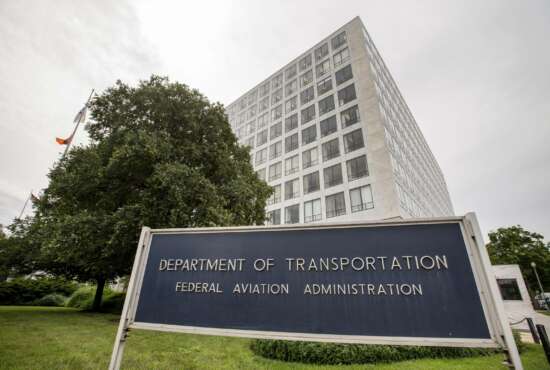An apparent attempt to disrupt Army conference with foul smell
In today's Federal Newscast, there's a criminal investigation underway into what appears to have been an attempt to disrupt the Army's annual TechNet conference
- There's a criminal investigation underway into what appears to have been an attempt to disrupt the Army's annual TechNet conference in Augusta, Georgia. Attendees arriving at the conference Tuesday morning were greeted by a foul odor in the venue’s main ballroom. Susan Lawrence, the president of AFCEA — the group that organizes the conference — said local authorities tested the facility for hazardous materials and deemed it safe for the conference to continue. But she said the investigation so far shows the smell was the result of a “willful act,” and that local authorities are investigating.(Morning Keynote with Gen. Brito - AFCEA via YouTube)
- Employees at the Federal Deposit Insurance Corporation say they’re still fearful of retaliation for coming forward about mistreatment in the workplace. The sentiment comes months after reports of pervasive harassment and bullying at the FDIC. The National Treasury Employees Union, which represents FDIC workers, said it continues to hear from feds who say they still see improper behavior going unpunished. NTEU is now calling for FDIC leadership to implement more stringent anti-harassment training, as well as more transparency on how and when workplace incidents are resolved. (FDIC employees frustrated at lack of workplace change - National Treasury Employees Union)
- The Equal Employment Opportunity Commission is pushing agencies to improve how they handle workplace disputes. The EEOC said the Alternative Dispute Resolution (ADR) process can lead to more successful results. ADRs bring in a neutral third party to help settle a workplace dispute before it reaches the point of litigation. But the process is still far from perfect. About two-thirds of employees that EEOC surveyed said they were dissatisfied with the fairness of the process. In a new report, EEOC recommends how agencies can improve the dispute resolution process, for instance by providing more training and education to staff. Ultimately, EEOC said the earlier agencies can resolve workplace disputes, the better. (Effectiveness of Alternative Dispute Resolution in the federal sector - Equal Employment Opportunity Commission)
- The Treasury Department is on the cusp of finalizing its updated Evidence and Evaluation Policy. It also is close to finishing up a new scientific integrity policy. These are two of steps the agency is taking to fully implement the Evidence Based Policymaking Act, which became law in 2018. A new report from the Government Accountability Office detailed Treasury and 22 other civilian agencies' actions across six topics and 12 common themes to fulfill the law's requirements. Auditors also analyzed the Office of Management and Budget's guidance and oversight of the legislation. Among the progress GAO found was a majority of the civilian agencies hired or trained staff to have evidence-building skillsets and identified evidence building activities. GAO made two recommendations, including for OMB to do more to make sure the Evidence Officer Council shares lessons learned and best practices.(Evidence-based policymaking: Agencies need additional guidance to assess their capacity - Government Accountability Office)
- Top Republicans on the House Homeland Security Committee are raising alarms about cases of so-called “Havana Syndrome” among federal employees. Hundreds of people, most of them State Department or intelligence community employees, have reported anomalous health incidents since 2016. Symptoms include brain injuries, headaches and dizziness. The HAVANA Act passed by Congress is providing financial support to federal employees suffering from these brain injuries. But lawmakers said the Defense Department and the Defense Health Agency have not yet fully spent the funds set aside for this purpose. The committee is requesting an update on the issue from the National Security Council. (Chairmen Green, Pfluger press the White House on ‘Havana Syndrome’ response - House Homeland Security Committee )
- The Federal Aviation Administration is proposing new cybersecurity rules for airplanes. The FAA said aviation equipment is increasingly interconnected and susceptible to potential cyber attack. The proposed rules would require aircraft manufacturers to take steps to protect airplanes and associated equipment from cyber threats. The FAA released the proposed rules this week. Comments are due by October 21.
- The National Institute of Standards and Technology is out with new digital identity guidelines. The draft NIST guidelines add more detail around the use of emerging technologies, like mobile drivers licenses and digital passkeys. NIST’s National Cybersecurity Center of Excellence is also planning to test out the use of mobile licenses for accessing government services. NIST officials said they want to balance security and access when it comes to proving your identity online. Comments on the draft guidelines are due by Oct. 7.(NIST opens the aperture on digital identity with new draft guidance - Federal News Network)
- The Defense Information Systems agency is ready to migrate the next group of users to DoDNet. Eight defense agencies, including the Defense Contract Management Agency and Defense Contract Audit Agency, are set to begin their migration to DoDNet soon, with the first migration expected to start in October. An additional six agencies and field activities are expected to begin their discovery phase by the end of 2024, bringing the total number of DAFAs involved in this migration process to 14. DISA plans to add 100,000 users to DoDNet within the next 18 months. (DISA to migrate the next group of DAFAs to DoDNet - LinkedIn)
- The Air Force takes the next step in modernizing the infrastructure of its bases. The Air Force awarded 23 companies a spot on its Base Infrastructure Modernization contract vehicle as the second piece to its enterprise IT-as-a-service (EITaaS) program. The 10-year contract has a total ceiling of $12.5 billion. Under the BIM vehicle, the Air Force will upgrade the wired and wireless networks on its bases to bring capabilities from buildings to flight lines. The Base Infrastructure Modernization program follows Wave 1 of EITaaS, which the Air Force rolled out to nine installations as a pilot. The service received 47 bids under the BIM vehicle and unsuccessful vendors have until late August to file a protest. (Contract awards for Aug. 16 - Department of Defense)
- The IRS is rolling out its free, online tax-filing platform to yet another state. More than 600,000 taxpayers in Wisconsin will get to use Direct File next filing season. It’s the seventh state to opt in since the IRS made it a permanent program. The agency expects at least half of all states will opt into Direct File before the next filing season. More than 140,000 taxpayers in a dozen states piloted Direct File earlier this year. (Department of the Treasury announces Wisconsin will join IRS Direct File for filing season 2025 - Treasury Department )
Copyright © 2024 Federal News Network. All rights reserved. This website is not intended for users located within the European Economic Area.
Eric White
Eric White is news anchor and Federal Drive producer at Federal News Network.
Follow @FEDERALNEWSCAST
Related Stories
Related Topics





